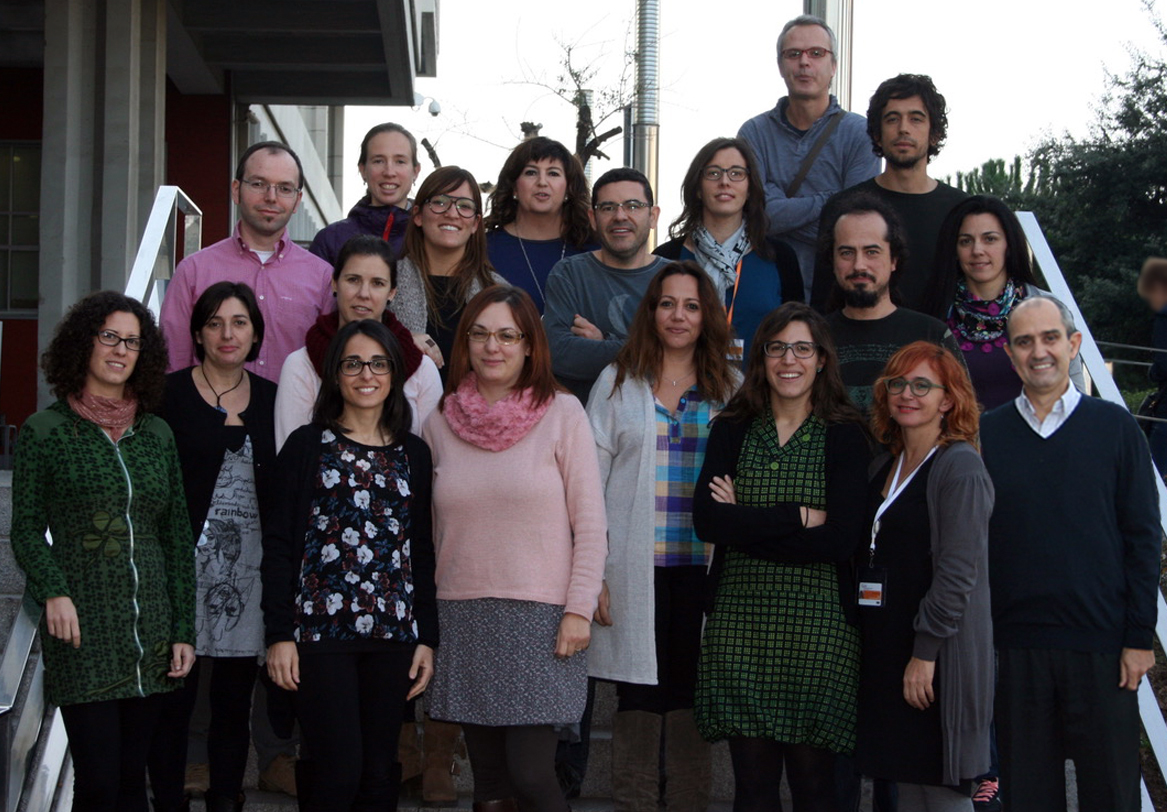A new way to diagnose hereditary cancers is already benefitting patients in the Catalan Health Service thanks to ground-breaking research by the Joint Program on Hereditary Cancer ICO-IDIBELL-IGTP

Researchers of the Joint Program on Hereditary Cancer ICO-IDIBELL-IGTP have designed and tested a new strategy based on next generation sequencing (NGS) for the genetic diagnostics of hereditary cancer. They tested it against other current commercially available NGS methods and the new method gave better results. Previously patients were only tested for one or a small number of genes but now each patient can be tested for a wide range of genes in one single step and the results analysed using complex computing tools resulting in a much more efficient diagnostic process. 700 patients in the Catalan Health System have already benefitted from the new diagnostic approach.
Cancer is a genetic disease (affecting genes) but in fact only 5-10% of cancers diagnosed are hereditary. Hereditary cancer refers to people born with some specific genes mutated so that they have a much higher risk of developing cancer than the rest of the population. Identifying them and providing the right care can be essential for both prolonging and improving quality of life. Thanks to the newly developed method of genetic diagnosis 700 people have already benefitted in Catalonia in six months and at a lower cost.
The three leading scientists are: Eduard Serra, leader of the Hereditary Cancer Group in the Program for the Predictive and Personalized Medicine of Cancer (PMPPC) at the IGTP; Conxi Lázaro, Head of the Molecular Diagnostics Unit in the Hereditary Cancer Program at the ICO and a researcher in the Hereditary Cancer Group at the Bellvitge Biomedical Institute (IDIBELL) and Gabriel Capellá, Director of the ICO Hereditary Cancer Program and Head of the Hereditary Cancer Group at the IDIBELL. Dr Capellá is also Director of the Joint Program on Hereditary Cancer ICO-IDIBELL-IGTP. This research has involved a multi-disciplinary team from the two research centres, which includes researchers working in the laboratory, bioinformaticians specialized in the computational analysis of genetic data, doctors and genetic counsellors working directly with the patients
The scientists have assembled what is known as a panel of all the known hereditary cancer genes. This allows them to sequence a sample from a patient and using computational analytical tools, identify whether a patient carries the mutated genes or not. Dr Eduard Serra explains that the fact that the Joint Program on Hereditary Cancer ICO-IDIBELL-IGTP has designed the panel of genes and their own pipeline of bioinformatic analysis means that they can continually adapt and improve it, giving them much greater flexibility and control, something more difficult to do using commercially available methods.
In a separate but related study, the new method was compared with currently available commercial gene panels and an alternative technique that involves sequencing all coding genes on the genome (exome analysis). 24 people were tested using the three methods and the results analysed to identify the advantages and disadvantages of each taking into account the strict quality requirements for clinical genetic testing. In this study scientists from the National Centre for Genomic Analysis of the Centre for Genomic Regulation (CNAG-CRG) collaborated on the analysis of the data. Overall the new method came out as the most appropriate to use for genetic diagnostics of hereditary cancer.
This work is an example of the new type of personalized and genetic medicine that was promised when the human genome was first sequenced in 2003. The benefits from this milestone discovery have been slower to come than expected, mostly because of the difficulties in interpreting the meaning of the sequence. However, in this case, patients suspected of inheriting altered genes conferring a higher than normal risk of cancer can have targeted parts of their genetic code sequenced and the presence or absence of specific factors can be identified using complex computational tools. With the results Genetic Counselling Service can advise individuals, doctors can design a tailored program of checks to identify possible cancers early and if necessary provide the exact treatment if the disease appears. It is an example of truly translational research: highly technical work in the laboratory and bio-computing has led to a protocol for genetically testing hereditary cancer patients and improving their management which is now in use in the Catalan Health System.
These results also highlights the need for highly trained multidisciplinary teams to fully embrace all the expertises required for the complex task of bringing genomic and bioinformatic technology into the clinics. The Joint Program for Hereditary Cancer promotes the use of excellence, technological innovation and the integration of different areas of research to provide better clinical practice and routine testing for everyone and access to better healthcare for all.
The Two Publications
Elisabeth Castellanos, Bernat Gel, Inma Rosas, Eva Tornero, Sheila Santín, Raquel Pluvinet, Juan Velasco, Lauro Sumoy, Jesús del Valle, Manuel Perucho, Ignacio Blanco, Matilde Navarro, Joan Brunet, Marta Pineda, Lidia Feliubadaló, Gabi Capellá, Conxi Lázaro & Eduard Serra. A comprehensive custom panel design for routine hereditary cancer testing: preserving control, improving diagnostics and revealing a complex variation landscape. Scientific Reports 7, Article number: 39348 (2017) doi:10.1038/srep39348
Lídia Feliubadaló, Raúl Tonda, Mireia Gausachs, Jean-Rémi Trotta, Elisabeth Castellanos, Adriana López-Doriga, Àlex Teulé, Eva Tornero, Jesús del Valle, Bernat Gel, Marta Gut, Marta Pineda, Sara González, Mireia Menéndez, Matilde Navarro, Gabriel Capellá, Ivo Gut, Eduard Serra, Joan Brunet, Sergi Beltran & Conxi Lázaro. Benchmarking of Whole Exome Sequencing and Ad Hoc Designed Panels for Genetic Testing of Hereditary Cancer. Scientific Reports 7, Article number: 37984 (2017) doi:10.1038/srep37984
Nou avenç per millorar el diagnòstic genètic per a les famílies amb càncer hereditari
L'Institut Català d'Oncologia (ICO), l'Institut d'Investigació Biomèdica de Bellvitge (IDIBELL) i l'Institut de Recerca Germans Trias i Pujol (IGTP) han dissenyat una nova estratègia de diagnòstic genètic que seqüencia en un sol pas tots els gens que predisposen a desenvolupar càncer. Aquesta nova estratègia millora l'eficiència diagnòstica respecte a d'altres ja existents i fa sis mesos que s'ha implementat en el sistema català de salut, on ja se n'han pogut beneficiar més de 700 persones. Els resultats s'han publicat en dos articles a la prestigiosa revista científica Scientific Reports.
L'equip multidisciplinari que conforma el Programa Conjunt de Càncer Hereditari de l'Institut Català d'Oncologia-IDIBELL i l'Institut Germans Trias i Pujol ha fet un pas endavant en el diagnòstic de persones amb una alta predisposició genètica a desenvolupar càncer mitjançant el desenvolupament i la implementació d'una nova estratègia diagnòstica. Basada en eines genòmiques i en la utilització d'anàlisis bioinformàtiques pròpies, aquesta estratègia millora l'eficiència diagnòstica gràcies a que permet seqüenciar tots els gens de càncer hereditari a la vegada i analitzar-los per paquets segons la presentació o sospita clínica del pacient.
En els sis mesos des de la seva implementació ja se n'han pogut beneficiar més de 700 persones. El desenvolupament i la implementació d'aquest nou sistema de diagnòstic genètic s'acaba de publicar en dos articles a la revista Scientific Reports.
Reduir l'impacte del càncer a partir del diagnòstic genètic: nous reptes tecnològics
El Programa Conjunt de Càncer Hereditari ICO-IDIBELL-IGTP treballa intensament per reduir l'impacte del càncer a Catalunya mitjançant la identificació d'alteracions en gens que, quan estan mutats en individus i famílies, eleven el risc de desenvolupar càncer. Actualment, el camp del diagnòstic genètic està vivint una revolució amb l'aplicació de les noves metodologies de seqüenciació massiva o de nova generació (Next Generation Sequencing, NGS, en anglès).
Aquests avenços estan canviant el paradigma del diagnòstic genètic, ja que s'ha passat d'analitzar un o pocs gens, a analitzar-ne desenes o centenars a la vegada (el que s'anomena panells de gens) o fins i tot, tots els gens del genoma humà (exoma). Aquestes noves possibilitats d'anàlisi permeten identificar l'alteració genètica causant de l'alta predisposició al càncer de manera molt més eficient, especialment en individus i famílies on la diagnosi clínica d'aquesta predisposició és complexa.
És en aquest context on el Programa Conjunt ICO-IDIBELL-IGTP ha desenvolupat una nova estratègia diagnòstica, anomenada I2HCP, que permet seqüenciar tots els gens de càncer hereditari a la vegada i analitzar-los posteriorment per paquets de manera personalitzada segons la sospita clínica del pacient. La nova estratègia ha permès millorar l'eficiència del diagnòstic i donar resposta a més de 700 pacients des que l'I2HCP es va implementar al sistema català de salut fa sis mesos.
Nova estratègia diagnòstica publicada en dos treballs a Scientific Reports
La prestigiosa revista científica Scientific Reports acaba de publicar dos articles liderats pel Programa Conjunt de Càncer Hereditari ICO-IDIBELL-IGTP on es presenta la nova estratègia de diagnòstic I2HCP i es compara amb altres estratègies existents.
En el primer article es descriu el desenvolupament, validació i implementació de la nova estratègia diagnòstica, un procés d'innovació i translacional que ha requerit un esforç continu durant els darrers anys. Al tractar-se d'un sistema propi, permet retenir tot el coneixement i el control sobre tot el procés de diagnòstic, proporciona una alta flexibilitat en l'anàlisi i accelera la incorporació de nous gens amb utilitat clínica. L'article identifica aquests factors com claus per entendre la millora del diagnòstic genètic.
La implementació d'aquest sistema ha requerit un canvi en la manera de treballar en els grups de diagnòstic genètic, que ha passat a ser totalment multidisciplinària degut a l'alt nombre d'experteses que es requereixen: diagnòstic genètic molecular, tecnologies genòmiques, diagnosi clínica i d'oncogenètica, consell genètic, bioinformàtica, etc. El treball també posa en valor la possibilitat d'utilitzar aquesta tecnologia per quantificar de manera més personalitzada el risc genètic a desenvolupar càncer.
El segon treball publicat ha comptat amb la col·laboració de l'equip del Centre Nacional d'Anàlisi Genòmica (CNAG) - CRG. En aquest treball es compara el rendiment en el diagnòstic genètic del nou panell en relació a un panell de gens comercial i a l'estudi de tots els gens del genoma. L'estudi compara les diferents estratègies en un sèrie de 24 pacients, 10 portadors d'una mutació coneguda (sèrie control) i 14 amb sospita de càncer hereditari però amb mutació prèviament no identificada (sèrie descobriment) i ressalta la idoneïtat de l'estratègia desenvolupada pel Programa Conjunt ICO-IDIBELL-IGTP en Càncer Hereditari.

